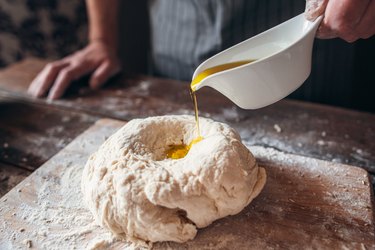
There are many health benefits to opting for olive oil, which is why we love it in a salad vinaigrette, sautéed vegetables and drizzled over soup. But have you considered using olive oil in baked sweets?
Olive oil has a distinct flavor that's more noticeable than neutral oils like canola. But in some baked desserts, it's a good match, providing deep flavor while also bumping up the baked good's moistness.
Video of the Day
Video of the Day
Not many baked good recipes list olive oil on the ingredient list, so you'll need to adapt your cooking process accordingly. Find out how to use olive oil in your pastries — and when it's best avoided.
Why Use Olive Oil in Place of Other Fats?
The health benefits are the biggest draw. Most of the fat in olive oil is monounsaturated — and, according to the American Heart Association, this type of fat is beneficial to your health, especially as a replacement for saturated or trans fats. Keep in mind that moderation is a key factor: Just because you sub in olive oil for butter in a sweet treat does not necessarily make it a health food. It's still an indulgence!
In a January 2011 study, participants who followed a Mediterranean diet — which praises olive oil — showed a 52 percent reduced incidence of diabetes compared to participants who did not follow this diet, per research published in Diabetes Care.
How to Bake With Olive Oil
If a recipe calls for vegetable oil or melted butter, you can try olive oil in its place, says Julie Harrington, RD, chef, culinary-nutrition consultant and co-author of The Healing Soup Cookbook.
Choose a mild, extra-light olive oil so that its flavor won't stand out too much, she suggests. You can make a one-to-one substitution of olive oil for vegetable oil. If you don't have extra-light olive oil on hand, use a half-and-half approach. Mix half of the required vegetable oil with an equal amount of extra-light olive oil.
"When substituting olive oil for butter, the rule of thumb is to use 3 tablespoons oil for every quarter cup butter," says Harrington.
Mediterranean-style fruitcakes, biscotti and muffins that boast a savory or nutty flavor work best with olive oil. It also tends to enhance fruit or vegetable loaves, such as pumpkin, cranberry or zucchini. Desserts with big flavors — like brownies — can also stand up to olive oil's flavor.
Read more: 10 Desserts That Won't Derail Your Diet
When to Avoid Olive Oil in Sweet Baked Goods
If the first step of a recipe demands that you cream butter and sugar together — a very common starting point for cakes and cookies — then you're best off sticking with the butter the recipe calls for, and not substituting in olive oil.
"The creaming process gives baked goods a light and airy texture that can't be replicated with olive oil," says Harrington.
Was this article helpful?
150 Characters Max
0/150
Thank you for sharing!
Thank you for your feedback!